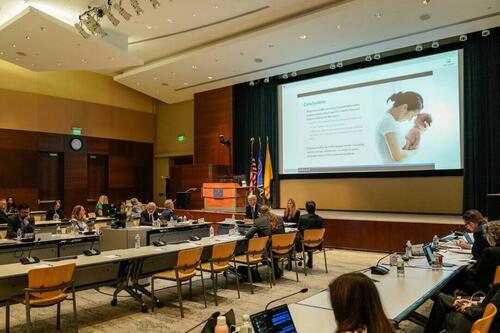Declared Conflicts Of Interest for CDC Advisers Dropped Before RFK Jr. Dismissals: Study
Authored by Zachary Stieber via The Epoch Times (emphasis ours),
Conflicts of interest declared by vaccine advisers to the Centers for Disease Control and Prevention (CDC) dropped significantly before the advisers were all dismissed by Health and Human Services (HHS) Secretary Robert F. Kennedy Jr., according to a new study.

The reported conflict of interest prevalence rate at Advisory Committee on Immunization Practices (ACIP) meetings declined from 13.5 percent between 2000 and 2004 to 6.2 percent between 2016 and 2024, researchers found after examining declared interests in a new tool released by the HHS, the CDC’s parent agency.
The average annual rates of conflicts reported by ACIP members fell from 42.8 percent to 5 percent.
There was also a decline over time in reported conflicts of interest for the parallel panel that advises the Food and Drug Administration, although the conflict reporting rate for that panel bounced back up from zero percent per meeting between 2008 and 2015 to 1.9 percent between 2016 and 2024.
The study was published by the Journal of the American Medical Association on Aug. 18.
“In the past, there have been high levels of reported conflicts on influential vaccine committees, but there has been substantial progress since the early 2000s,” study coauthor Genevieve Kanter, senior scholar at the Schaeffer Center and associate professor at the University of Southern California Sol Price School of Public Policy, said in a statement. “Although it’s important to remain vigilant, conflicts of interest on vaccine advisory committees have been at historically low levels for quite some time.”
The study was funded in part by the Harvey Motulsky and Lisa Norton-Motulsky Fund. Kanter and a coauthor also reported receiving funding from Arnold Ventures for unrelated work.
The study only examined declared conflicts of interest. An Epoch Times review found that multiple ACIP panel members in 2024 cast votes on vaccine recommendations even though they were receiving, or had recently received, money from companies that would be affected by the recommendations.
“HHS is ensuring radical transparency and restoring public trust,” HHS spokesman Andrew Nixon told The Epoch Times via email. “Earlier this year we launched the ACIP Conflicts of Interest tool so the public can easily view historical conflicts.
“Secretary Kennedy is committed to eliminating both real and perceived conflicts to strengthen confidence in public health decisions.”
When dismissing all 17 members of ACIP in June, Kennedy said in an op-ed that “the committee has been plagued with persistent conflicts of interest and has become little more than a rubber stamp for any vaccine.”
He cited a 2000 report that found that conflicts of interest were rife among members of the CDC and Food and Drug Administration advisory panels. He also cited a 2009 inspector general report detailing unresolved conflicts of interest for a majority of special CDC government employees, such as ACIP members.
“These conflicts of interest persist,” Kennedy said at the time. “Most of ACIP’s members have received substantial funding from pharmaceutical companies, including those marketing vaccines.”
ACIP advises the CDC on immunization schedules and other vaccine-related matters. The CDC typically adopts its advice.
Tyler Durden
Sat, 08/23/2025 – 14:00
Source link

















